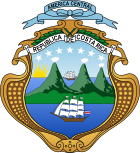 |
|---|
|
|

Calderonism or Calderonismo is a political and ideological doctrine of Costa Rica, which emerged in the 1940s under the leadership of caudillo Dr. Rafael Ángel Calderón Guardia, before, during and after he was president with his National Republican Party, and which was continued by various political forces such as Unity Coalition, National Unification Party and the current Social Christian Unity Party and its split the Social Christian Republican Party.[1] It is together with Liberacionismo one of the two traditional political tendencies of Costa Rican politics, with which it represented a certain type of Costa Rican bipartisanship from 1986 to 2002 and revolves around the Calderón family. It is a form of populist and Catholic Christian socialism very similar to Argentine Peronism. Considered a progressive interpretation of the Catholic social teaching,[2] as well as a form of socialism,[3] Calderonism identified itself with comunismo a la tica, defined as indigenous and Catholic communism exclusive to Costa Rica.[4] Because of this, Calderonism is also referred to as calderocomunismo.[5]
Calderonist policies "integrated Marxist, social Christian and state bureaucratic tendencies",[6] and have been described as socialist,[7] social democratic,[8] and social Catholic.[6] That the Calderón formed an alliance between the Catholic Church and the communist party to carry out socialist reforms is considered a precursor to liberation theology.[8] Calderón was described as very similar to the Guatemalan President Juan José Arévalo, as both pursued expansive worker rights, public health and social security programs.[8] Arévalo likewise represented a Christian and populist form of socialism, which he called "spiritual socialism".[9] Calderón's reforms greatly empowered the Costa Rican trade unions and labor force, providing them with constitutional guarantees and strictly enforced judicial protection; communist trade unions became dominant while the Church was able to found successful Catholic labor confederations. Calderonism also directly challenged the powerful domestic and foreign business interests of Costa Rica, sparking business-based opposition and subversion.[6]
- ^ "Aberraciones históricas en política partidaria". primeraplana.or.cr.
- ^ Cite error: The named reference
diegowas invoked but never defined (see the help page). - ^ Cite error: The named reference
amerwas invoked but never defined (see the help page). - ^ Cite error: The named reference
excepwas invoked but never defined (see the help page). - ^ Cite error: The named reference
diazwas invoked but never defined (see the help page). - ^ a b c Miller, Eugene D. (October 1993). "Labour and the War-Time Alliance in Costa Rica 1943-1948". Journal of Latin American Studies. 25 (3). Cambridge University Press: 515–541.
- ^ Rausch, Lisa (2005). "The Coffeeness of Costa Rica". Central American Theses and Dissertations. University of Kansas: 36.
- ^ a b c Rose, Thomas L. (March 2014). "Institutional Weakness as a Blessing: The Origins and Development of Costa Rican Exceptionalism Vis-à-vis Central America's Structural Disadvantage Within the Capitalist World-System". Research Higher Degree Thesis. University of Newcastle: 72-105.
- ^ Handy, Jim (1984). Gift of the Devil. Toronto: Gagne. p. 107. ISBN 9780896082472.